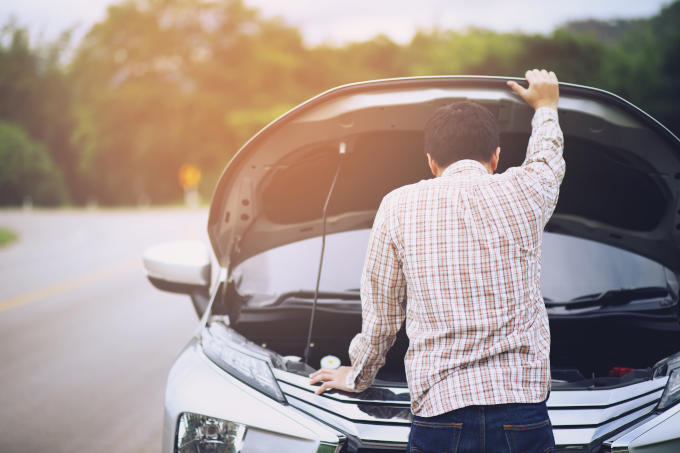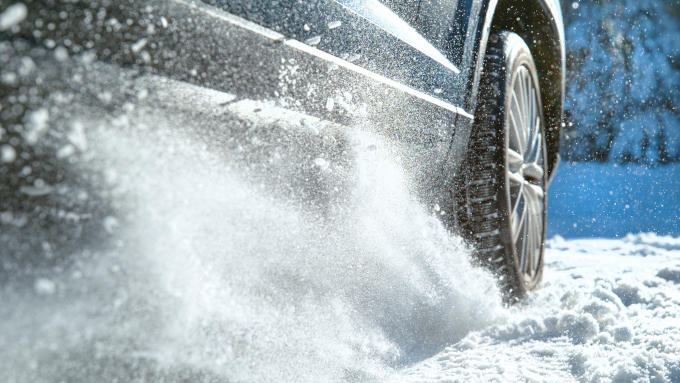Published on 10/18/2015
Last updated 03/17/2022
Pulling over to the side of the road is never an expected event, but sometimes it is the best decision you can make. There are various reasons you may need to pull your vehicle over, and many of them can be prevented with routine maintenance and pre-trip vehicle checks. Here are some of the top reasons to consider stopping:
1. Extreme Weather
Check the weather forecast before driving. Weather can change quickly—and the last thing you want is to be on the road when a storm hits. Extreme weather that even your windshield wipers on full speed cannot handle can be incredibly hazardous. If conditions become too dangerous, slow down, put on your 4-way flashers, and safely pull off the highway into a parking lot and wait it out. Get off the road as soon as possible to a safe location. Pulling off onto the side of the road can be dangerous if visibility is low and other drivers cannot see well. If you see any accumulated water on roads, never drive directly into it. Even if you don't get stuck, water and engines don't mix well, resulting in serious and expensive damage.
2. Engine Problems
A vehicle that isn't running properly can be a liability on the road. When your engine starts to act funny, it may be a sign that you should pull over and check things out. There are a variety of potential engine issues to watch for, including:
- Loud noises: Don’t ignore any unusual or loud noises in your engine. It may be a sign of serious trouble ahead.
- Smoke: If you see smoke coming from your engine, it's definitely time to safely pull over and take a look. It could be a sign of overheating, which can cause catastrophic damage quickly. If it is overheating, do not check the fluid! It could geyser out and scald you. Let it cool down before attempting any liquid checks.
- Strange smells: A burning smell, gasoline smell, or any other strange odor can be cause for alarm.
- Check Engine Light (CEL): If your vehicle's check engine light comes on—especially if it’s flashing—it's time to pull off the road and find out what's going on. If you aren't sure what the problem is, call for assistance immediately.
3. Tire Trouble
If you notice that your vehicle is starting to wobble or vibrate, pull to one side, or you hear a terrible thumping and clunking, immediately but carefully pull over and check your tires and wheel lugs. Make sure you have a spare tire, jack, and lug wrench with you—and know how to use them!
If you have a flat tire, don't panic. Carefully pull as far over to the side of the road as you can, put on your 4-way flashers, and take care of the issue. If you are in a high-traffic area like a highway, call roadside assistance through your insurance company or AAA. In dangerous situations, call 911 and wait for assistance. If you must exit the vehicle, watch all around you for traffic before you open the door and exit the vehicle. It may be safer to exit from the passenger side or stay in until help arrives.
4. Transmission Slipping
If your vehicle’s transmission starts slipping, this is usually a symptom of transmission failure, and it's time to safely pull over. For instance, if you try to speed up but your vehicle doesn’t accelerate and the engine is revving high, this may be a sign that there is something wrong with the transmission. Drive to a safe place as quickly and safely as possible and call for help.
5. Steering Problems
If you start to experience problems with steering, it's time to pull over. Steering issues can signify many different issues, including vehicle steering and suspension issues, loose, low, or misaligned tires that cause drifting or pulling, low power steering fluid, or a defective steering gear making it difficult to turn and steer properly.
6. Brake Issues
If braking distance seems to increase or your brake pedal feels “spongey,” you have an extremely high and very hard pedal that doesn’t slow down easily, or you feel the brake pedal or steering wheel vibrating or pulsating violently when you try and stop, it may be a sign of brake failure. If this happens, you need to pull over as quickly and safely as possible. Brake failure can be very dangerous at any time while driving. If the vehicle is experiencing a lack of brake pedal response, going to the floor, or is rock hard and very high, having your vehicle towed to the nearest auto shop is the smart thing to do. If you hear scraping or squealing noises, or the pedal is pulsating lightly but the pedal feels normal and the vehicle stops reliably, you should still head to your nearest qualified service repair center and have them check it out for you.
7. Distracted Driving
Distracted driving is a killer. Minimizing distractions while driving saves lives. Distractions can come in many forms: high emotional states from a recent fight with a loved one; bored, irritable, fighting kids in the back seat; a screaming baby; your dog flipping out because it sees something exciting; an important phone call; an urgent text message; something interesting on the side of the road, etc. If something inside or outside your vehicle's cabin does not allow you to fully concentrate on the road and drivers around you, pull over and get things sorted out.
Tips to Avoid Mid-trip Stops
Nobody wants to deal with stops during a trip. While it's always important to be prepared for potential vehicle problems, there are a few things you can do to help avoid them:
1. Check your fluids
Make sure your vehicle has good, clean levels of oil, transmission fluid, coolant, brake fluid and washer fluid. Your vehicle will have a harder time running smoothly and you will have a harder time seeing where you are going if it's low on any of these fluids.
2. Perform routine maintenance
Regular vehicle maintenance can help prevent many common problems, such as a blown tire or engine trouble. Make sure to have your vehicle serviced regularly and check the oil level and other fluid levels before long trips.
3. Check your vehicle before you leave
Do a pre-trip check of your vehicle to ensure everything is in good working order. Look for things like fluid levels, tire pressure, wiper condition, and broken lights. If you spot any problems, take care of them before hitting the road.
When you're driving, it's essential to be aware of your surroundings and know what to do if something goes wrong. By being prepared and knowing when to pull off and over, you can help keep yourself and your passengers safe. Stay safe out there!
Better Safe Than Sorry
If you are concerned about any issue with your vehicle, AAMCO Lee’s Summit is here to help. We can help you figure out the problem and safely get you back on the road! Schedule an appointment today!










